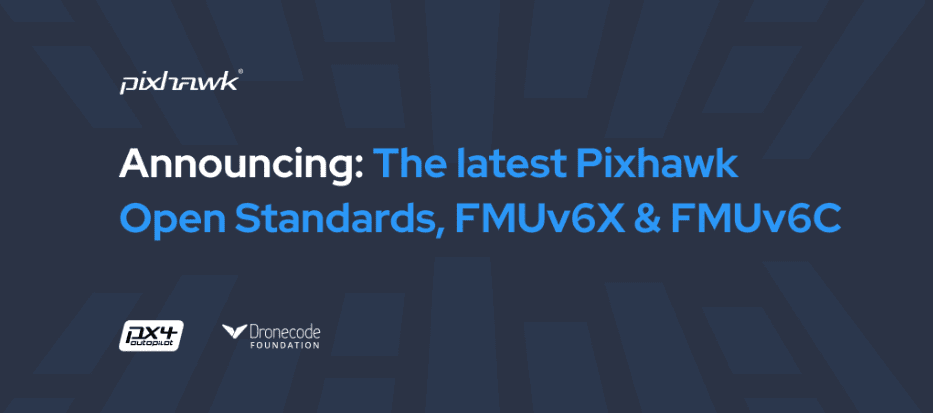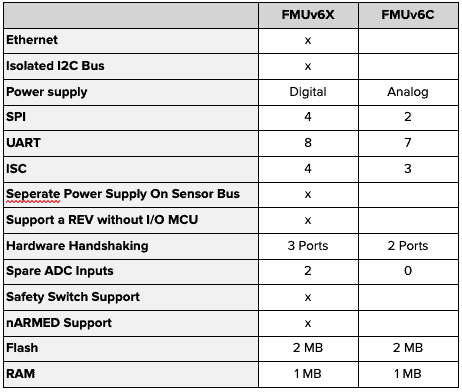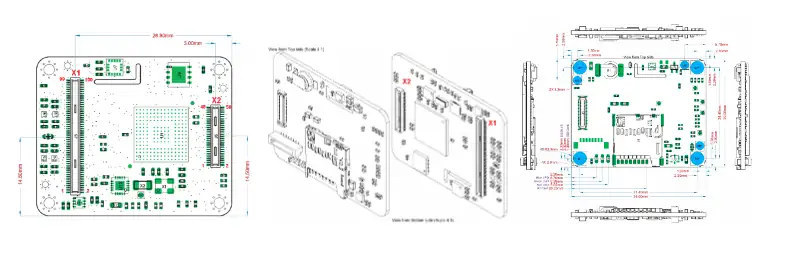
Pixhawk is a set of open standards endorsed by major semiconductor manufacturers, software companies, and drone engineering companies. These de facto standards cover requirements for many aspects of hardware and electronics design in drones. The Pixhawk Special Interest Group is in charge of developing the latest standards through recurring public meetings hosted by the Dronecode Foundation (DF).
The Open Standards are implemented by manufacturers, many of which are DF members, such as Auterion, ARK Electronics, Holybro, ModalAI, CUAV, 96Boards, and NXP Semiconductor. They release products or reference implementations for end-users or other organizations, all based on the Pixhawk standards. The Pixhawk ecosystem has been growing for over a decade and has achieved great success. It is estimated that more than a million Pixhawk-based devices are in the field at the time of writing.
The 6th generation of Pixhawk FMU’s is available in two versions:
- FMUv6X: the high-end version made for performance and reliability
- FMUv6C: made for the cost-conscious end of the market. Reliable and cost-effective
Every version of Pixhawk ships with the latest supported version of the PX4 Flight Controller by default.
The standard is now available for everyone to download here >>
Why adopt open source?
Choosing to adopt a robust and mature open-source community, can help organizations and developers get started quickly, thanks to the vast tools and rich feature set already available from decades of architectural improvements, critical safety considerations, many challenges already overcome, as well as a continuously growing ecosystem of hardware options to choose from.
Open standards begin with an open process. The Dronecode Foundation (DF), fosters the Pixhawk FMU (Flight Management Units) Open Standards with contributions and participation from the Pixhawk Special Interest Group during FMU Workgroup meetings. Participation is open to all members of the Dronecode Foundation. It is a mature community with a proven ecosystem of tools and services.
Delta Pixhawk 6X & 6C

FMUv6X Features
The FMUv6X generation brings the proven features from FMUv5X to a hardened form factor. It includes:
- High performance STM32H753 Processor
- Modular flight controller: separated IMU, FMU, and Base system.
- Ethernet interface for high-speed mission computer integration
- Three redundancy domains: Completely isolated sensor domains with separate buses and separate power supplies.
- Redundant sensors on separate buses, allowing continuous operation while losing a complete redundancy domain.
- Bosch BMI088 (TBC) (vibration isolated)
- TDK Invensense ICM-42688-P (TBC) (vibration isolated)
- TDK Invensense ICM-20649 (TBC)
- Bosch BMM150 compass
- Bosch BMP388 pressure sensor
- GPS external mag + baro #1
- GPS external mag + baro #2
- High accuracy barbed baro
- Calibration EEPROM for baseboard sensors
- On-IMU calibration EEPROM memory for high-accuracy sensors
- Automated sensor calibration eliminating varying signals and temperature
- Operating temperature -40 to +85°C
- FRAM memory for configuration data (SPI2)
- Extensive power monitoring
- Two smart batteries on SMBus or more on UAVCAN
- 5V rail monitoring
- 3.3V rail monitoring for CPU
- 3.3V rail monitoring for each sensor domain
- External sensor bus (SPI5)
- Redundant power supply: The autopilot can be powered from up to three power sources and every sensor set is powered by an independent LDO with independent power control
- Battery-backed real time clock for running security applications without GPS coverage
- Support for external NFC on I2C that provides an additional GPIO line along with the 5V to supply for the external NFC reader.
FMUv6C Features
- Cost effective SM32H743 Processor
- Low-profile form factor with cost-conscious all-in-one design
- Newly designed vibration isolation system
- Temperature-controlled IMUs
- Sensors available:
- IO Processor: STM32F103
- TDK InvenSense ICM-42688-P Accel/Gyro
- Bosch BMI055
- Isentek IST8310 Magnetometor
- TE Connectivity MS5611 Barometer
Hardware utilizing the Pixhawk 6 standards
At the time of this writing, four companies are manufacturing hardware utilizing the Pixhawk 6 standards:
- Auterion – Skynode
- Holybro – Pixhawk 6X & Pixhawk 6C
- CUAV – CUAV Pixhawk FMUv6X
- ARK Electronics – ARKV6X
In addition, some companies are creating new baseboards with companion computers, such as Raspberry Pis, and NVidia Jetson’s that run Linux, allowing the use of an API instead of modifying the PX4 Flightcontroller code. This increases the availability of options and showcases how innovation can build on top of open-source technology.
Companies offering baseboards with Pixhawk Autopilot Bus compatibility include: Auterion (Skynode, and AI), Holybro (Default, Mini, RPi CM4), CUAV (Default), and ARKElectronics (Default.)

How are the new Pixhawk FMUv6 standards making a difference?
“Auterion is continuously supporting Dronecode, and its projects, our commitment to open source and standards is part of our DNA. At Auterion, we take the invaluable work of a community of innovators, we integrate it with different services that create value for the end user, and deliver it to the wider market as an enterprise-ready product. The newest generation of FMUv6X is another great advancement, and we are looking forward to the value it will bring our customer base in future release cycles” – Lorenz Meier, co-founder and CEO of Auterion
“CUAV Pixhawk 6X is the result of close cooperation between CUAV and Dronecode. We implemented the mature and reliable FMUv6X open standard. CUAV has leveraged its in-house hardware design expertise to create a unique autopilot with very reliable sensors (IMU, barometer, RM3100 magnetometer) and a new shock absorption system. This makes it possible to extend its use to more industrial fields, making your imagination possible.” – Ray Bin, Founder and CEO of CUAV
“The ARKV6X flight controller is the perfect combination of advanced technology and versatile design, offering users the best of both worlds. Open standards are the foundation of a healthy and innovative industry, allowing for collaboration and progress without the constraints of proprietary technology.” – Alex Klimaj, Founder of ARKElectronics
“The Holybro Pixhawk 6X and Pixhawk 6C Flight Controllers have implemented the FMUv6X and FMUv6C open standards. We have followed the Pixhawk standards since 2018 and have continued to work closely with the PX4 Team and Dronecode to improve on them. It is great to see how far we have come with all the companies joining in on this effort to benefit the community as a whole.” – Vince Poon, CTO of Holybro
“From the very beginning our system was built with the Pixhawk flight controller at its heart. Upgrading to v6 will allow us to take the Sunflower Labs Beehive to a new level of autonomy, reliability and flexibility to meet our customer’s needs. The increased redundancy, computing power, hardware standards and incredible community support makes this an easy decision. We are proud to support and contribute to Pixhawk and the community that built it.” – Alex Pachikov, CEO at Sunflower Labs
How can manufacturers adopt the standards and become part of the community?
If you are interested in how to build your own drone flight controller utilizing the Pixhawk standards, there are a couple of options:
- Partner with a verified Pixhawk manufacturer – You can partner with manufacturers who are experts (they helped develop the standards). The include: Auterion; ARKElectronics; Holybro; and, CUAV. They are all Dronecode members and help to maintain the standards.
- Build your own using the Open Standards – If you would like to adopt the standard, you can start here, join the DF Discord channel, and participate in the monthly coordination calls for the FMU workgroup.
The best way to contribute to the open efforts hosted under the Dronecode Foundation is to become a member. By becoming a member, organizations can help support open standards and guarantee the continued success of the open-source projects hosted under our umbrella. Become a Dronecode member here >>
An exclusive benefit for Dronecode Foundation members is access to the reference schematics. Leverage access to the reference implementation of the open standards and boost your time to production.
Pixhawk Autopilot Bus Verification by Dronecode
Additionally, Dronecode can help validate standards implementation to guarantee cross-vendor compatibility of PAB modules and baseboards. After all, cross-vendor compatibility is a key benefit of using open standards. For a small fee Dronecode can help verify your implementation is up to standard, test against a known reference implementation, and verify cross compatibility with other validated hardware available to Dronecode.
Access to the Pixhawk Trademark
Once your flight controller is market-ready, Dronecode can help you access the Pixhawk trademark to help you demonstrate your Pixhawk standards-compliant hardware is tested as 100% compliant. It is an exclusive benefit for Dronecode members at an additional cost.
Find suppliers and manufacturers of Drone Flight Control Systems >>


















